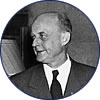Reinhold Niebuhr
1892–1971 B.D. 1914, M.A. 1915
|

|
Few theologians of stature have been as socially engaged as the man Hans Morgenthau called “the greatest living political philosopher in America.” Reinhold Niebuhr’s ability to function so effectively in the religious and secular spheres was related no doubt to his dislike of dogmatism, systems, and utopias. He felt that his Yale education had done a great deal to broaden his views philosophically. And yet Niebuhr was also prompt to take action in causes he found compelling. A major influence in this direction came from his service as pastor in a poor district of Detroit between 1915 and 1928.
Niebuhr came to New York to teach at Union Theological Seminary in 1928, and here the afflictions of the Great Depression led to an affiliation with the Socialist Party and an unsuccessful campaign for a Congressional seat. He was active in pacifist organizations until the rise of Hitler convinced him of the need to halt totalitarianism. Niebuhr was one of the founders of Americans for Democratic Action, a noncommunist leftist group, but this did not prevent him from serving as an adviser to the U.S. State Department.
Niebuhr’s theology was called neo-orthodox because of his non-literal reinterpretations of ancient doctrines of creation and sin. He combined this approach with his psychological insights into human nature, which he saw as subject to contrary forces of freedom and anxiety. These views were developed in the two volumes of his major work, The Nature and Destiny of Man, first published in 1941.

